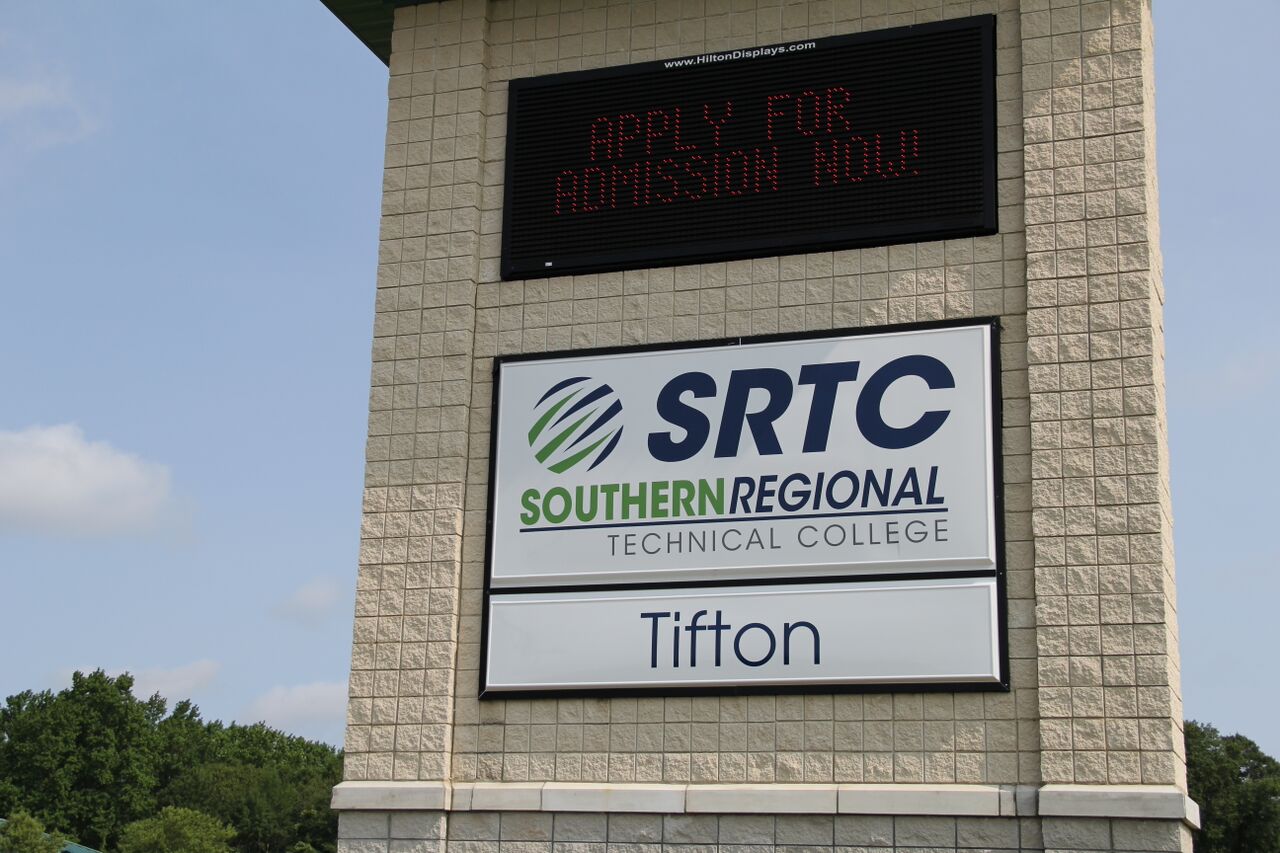Today marks the first official day of operation for Southern Regional Technical College (SRTC). Since the announcement of the merger of Moultrie Technical College and Southwest Georgia Technical College in 2014, the administrations for both Colleges have been steadily focused on the duties at hand: forming a new college that will provide greater access to services and programs for the students and communities they serve.
Dr. Craig Wentworth, President of SRTC, is a veteran of the Technical College System of Georgia and former President of Southwest Georgia Technical College. In addition to Dr. Wentworth the SRTC Presidents Leadership Cabinet will consist of a Provost and 9 Vice Presidents, responsible for ushering the new college into the future. Mr. Jim Glass will serve as Provost for the new College; Mr. Paul Roberts will serve as Vice President of Administrative Services; Mr. Ken Strickland will serve as Vice President for Strategic Initiatives; Mrs. Amy Maison will serve as Vice President of Institutional Advancement, Marketing, and Public Relations; Dr. Debbie Goodman will serve as Vice President of Institutional Effectiveness; Dr. Annie McElroy will serve as Vice President for Academic Affairs; Mr. Dennis Lee will serve as Vice President of Economic Development; Mr. David Evans will serve as Vice President of Operations; Mrs. Leigh Wallace will serve as Vice President of Student Affairs; and Mrs. Joyce Halstead will serve as Vice President of High School Initiatives and Enrollment Management.
The SRTC administration anticipates a total enrollment of over 3,600 students for the Fall semester. In addition to the aforementioned leadership cabinet, over 275 full-time personnel, 83 part-time staff members, and more than 190 adjunct instructors will be tasked with providing the highest level of service and education possible to students in both credit and non-credit programs.
The Technical College System of Georgia (TCSG) has used mergers as a way to reduce administrative costs while creating larger, more efficient colleges. In 2009, there were 33 colleges in the system. Since then, 17 have been merged into eight; the state technical college system is now comprised of 22 technical colleges and one technical division at a Board of Regents / University System of Georgia college.
As the previous mergers have shown, students experience little change in the day-to-day operation of their campuses. They have, however, gained from the benefit of a larger, more regional college that is more efficient financially and makes better use of shared instructional and technical resources among its campuses. There were no campus closings, and the colleges’ programs, including credit, adult education, continuing education, and customized workforce training for business and industry, will continue as before.
SRTC will serve a seven county area with locations in Ashburn, Cairo, Camilla, Moultrie, Sylvester, Thomasville, and Tifton. Moreover, Florida residents of Gadsden, Jefferson, and Leon counties qualify for in-state tuition. The Moultrie - Veterans Parkway Campus, Thomasville Campus, and Tifton Campus will be full-service locations, meaning students will have access to student affairs and enrollment services, academic offerings, and adult education (GED). The Moultrie – Industrial Drive instructional site offers predominately Industrial Technology programs (e.g., Welding and Joining, HVAC, Automotive Technology, etc.) while the Grady County instructional site offers Practical Nursing and Early Childhood Care and Education credit programs, high school dual-enrollment, and adult education. Additionally, adult education services are offered in Camilla, Sylvester, and Ashburn.
The College will offer over 150 programs in the classroom / labs and for online students. Within the classroom setting there will be a significant expansion of night classes at all full service campus locations. Furthermore, administrators estimate SRTC will have one of the largest Move On When Ready (MOWR) (formerly known as dual enrollment) programs in the entire system, topping 1,100 students. MOWR allows high school students to earn both high school and college credit toward graduation simultaneously, with course tuition covered by state MOWR funds or the HOPE grant. SRTC currently collaborates with Baconton Community Charter School, Bishop Hall Charter School, Cairo High School, Colquitt County High School, Mitchell County High School, Pelham High School, Thomas County Central High School, Thomasville High School, Tift County High School, Tiftarea Academy, Turner County High School, and Worth County High School on MOWR programs.
SRTC is committed to helping our graduates pursue their educational and career goals. To this end, SRTC has created partnerships with other colleges that allow students to articulate credit between the two institutions. The University System of Georgia, Albany State University, Thomas University, and Valdosta State University are all current partners of SRTC. Furthermore, the Technical College System of Georgia has standing agreements with Ashford University, DeVry University, Embry-Riddle Aeronautical University, Georgia Independent Colleges, Life University, Mercer University, Southern Polytechnic State University, Troy University, and the University of Phoenix, though SRTC does not have individual agreements with those institutions.
For the most up-to-date information on registration and class dates as well as program offerings and other merger facts, log on to www.southernregional.edu.
A Unit of the Technical College System of Georgia
